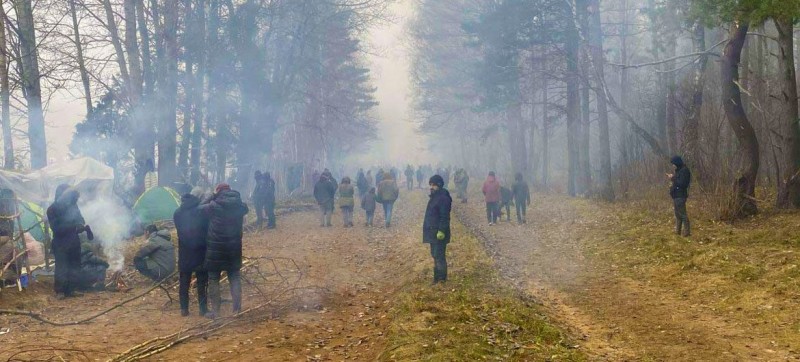People at Belarus-Polish border. Independent UN experts expressed deep concern on Tuesday over allegations that human rights defenders have been threatened at the Polish-Belarusian border, including media workers and interpreters. “I am receiving several reports of harassments from human rights defenders who assist migrants and document human rights violations against them, at the Polish-Belarusian border, and I am deeply concerned at this practice”, said Mary Lawlor, Special Rapporteur on the situation of human rights defenders. Ms. Lawlor and Irene Khan, Special Rapporteur on the right to freedom of opinion and expression, underscored that Poland must investigate all harassment allegations and grant border access to journalists and humanitarian workers so they can do their jobs freely and safely.
Interpreters intimidated
One example, is the case of Jakub Sypiański, a volunteer interpreter assisting migrants and asylum-seekers, who was reportedly stopped by armed soldiers while driving home last November.
The soldiers, who were in an unmarked vehicle, did not identify themselves nor explain their actions.
They forced open the car door, took the keys out of the ignition and attempted to pull Mr. Sypiański out by his legs.
“Most of the migrants at the border do not speak Polish”, said Mary Lawlor. “Interpreters play a vital role in ensuring their human rights are protected both at the border and in immigration detention centres.”
‘Appalling’ behaviour
In the same time period, armed soldiers reportedly harassed journalists covering the arrival of migrants and asylum seekers.
Outside a military camp, soldiers – who did not identify themselves – stopped, searched, and handcuffed photojournalists Maciej Moskwa and Maciej Nabrdalik.
The military men then searched their equipment, scrutinized their photos, and documented their phone messages and incoming calls.
Meanwhile, journalists Olivia Kortas and Christoph Kürbel, along with two local Polish residents, were allegedly harassed by soldiers while filming a documentary about the human rights situation of migrants at the border.
“Reports that these journalists are being persecuted for documenting such human rights violations are appalling”, said Ms. Khan.
Rapporteurs speak up
The expert on the right to freedom of opinion explained that if they are not allowed to do their job, “there are very serious consequences for the human rights of migrants”.
“Their work is crucial for everyone’s access to information about the situation unfolding at the border”, she said.
Ms. Lawlor reminded that according to the UN Declaration on Human Rights Defenders, interpreters, journalists, medics, lawyers and others who peacefully work for the protection of human rights or who provide humanitarian aid, are human rights defenders.
“Poland should bear this in mind and ensure that they are able to carry out their legitimate work in a safe and enabling environment and with full access to the border area”, she stated.
Expert endorsements
The experts are in contact with the Polish authorities on the matter.
Their call to end the human rights infringements was endorsed by Special Rapporteur on the human rights of migrants Felipe González Morales and, and the Working Group on arbitrary detention, comprised of Elina Steinerte (Chair-Rapporteur), Miriam Estrada-Castillo (Vice-Chair), Leigh Toomey, Mumba Malila, and Priya Gopalan,
Special Rapporteurs are appointed by the Geneva-based UN Human Rights Council to examine and report back on a specific human rights theme or a country situation. The positions are honorary and they paid for their work.




Comments are closed.